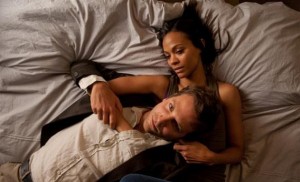The Words
Posted on September 7, 2012 at 2:57 pm
 This movie about an unsuccessful writer who appropriates an old manuscript and sells it as his own feels like a movie made by a writer who has the same problem.
This movie about an unsuccessful writer who appropriates an old manuscript and sells it as his own feels like a movie made by a writer who has the same problem.
This is an idea that has already been explored by Woody Allen (“You Will Meet a Tall Dark Stranger“), Frankie Muniz (“Big Fat Liar“), and Ira Levin (“Deathtrap”) and it is of far more interest and appeal to a writer struggling between the passion to tell a story and the self-doubt that blocks the progress from the idea to the page. But this idea should have stayed where it was.
It’s a story within a story within a story. And a long flashback. The movie opens with its first preposterous setting — a distinguished author named Clay Hammond (Dennis Quaid) is on stage in an auditorium with a rapt audience but apparently all he is there to do is read aloud from his book, with an intermission in between for him to chat up and be chatted up by Daniella, a pretty grad student (Olivia Wilde). In real life, with the possible exception of a story hour for preschoolers, authors do more in front of audiences than recite the words in the book, but in the world of this movie, that is what this one does.
Much of the film is the story he reads, and this is the part about the poor but (temporarily) honorable young writer named Rory Jameson (Bradley Cooper — character names are not this movie’s strong point) who is just fine with having his father and his gorgeous and devoted wife Dora (Zoe Saldana) support him while he bangs away at his keyboard, looking intense. “I gotta pay my dues!” he says when asked for yet another loan from his father. “No, I gotta pay your dues,” says his dad, suggesting maybe writing should just be Rory’s hobby.
He finally takes a job pushing the mail cart at a publishing company. After a couple of years, he produces a manuscript, which is rejected by everyone, most painfully by an agent who gives him the most devastating assessment possible: he thinks it is brilliant but unpublishable. At least if it was lousy, Rory could give up.
And then, in an old leather portfolio Dora buys at a Parisian curio shop, Rory finds a manuscript. He types out every word just to feel the sentences go through his fingers. Dora loves it. He submits it to the publisher. The publisher loves it: “It’s so interior! It’s artistic, it’s subtle, it’s a piece of art,” he says, like no person in publishing ever. Then the critics and the readers love it, even though it has the dumb name, “The Window Tears.” (Rain, right?) And then an old man, this one thankfully without a name and even more thankfully played by Jeremy Irons, shows up. He is the author.
Remember, this is all still Dennis Quaid’s book, the one he is reading aloud to the audience. And then we get a flashback within a story within a story as Jeremy Irons tells us how the manuscript was written and how it got lost. It is about this time that the movie gets lost, too, as we go back and forth between Rory’s attempts to put things right and Clay’s strange encounter with Daniella in his apartment filled with unpacked boxes. There are some random parallels between the stories (a guy in an undershirt hugging a woman standing at the kitchen sink, dealing with a loss by getting drunk, and some sophomoric exchanges about truth and art, and then it does not end — it just stops.
Parents should know that there are some sensual but non-explicit sexual situations, a tragic death of an infant, drinking and drunkenness, some strong language, and a lot of smoking. There are also brief not-graphic war images.
Family discussion: What should Rory have done when the publisher told him he loved the manuscript? What should Dora have done when she found out the truth? What does the framing story add to the meaning of the film?
If you like this, try: “The Stone Reader,” a documentary about a real-life search for a mysterious author of a critically acclaimed but forgotten book and learn about the real-life story of a famous author’s lost manuscript

You review brought to memory two Jerzy Kosinski stories, and of course his novel “Being There” became a marvelous movie. The first story is that Kosinski is accused of ‘heavily borrowing’ the Polish novel “Career of Nicodemus Dyzma” for “Being There” and of hiring an American poet to translate and rewrite, in English, his own “Painted Bird” from a Polish typeset.
The next story is about writer Chuck Ross, now publisher of Television Week. Apparently beaten down by rejections, Ross typed up all of Kosinski’s “Steps” and sent it under the name Erik Demos to 14 publishers who all rejected it. “Steps” had been a National Book Award winner with 400,000 copies sold. Later Ross sent his Steps to six literary agents (all rejected) and then typed up the “Casablanca” screenplay and sent it to 217 producers, much wiser: 33 recognized it. 38 wrote him that they read it, and rejected it.
Great comment, Andrew, thanks. I remember the Kosinski controversies very well, and I love the “Steps” story!